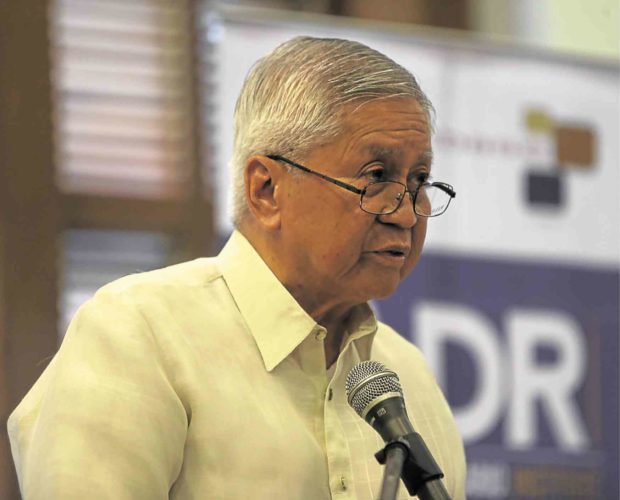Invoke arbitral ruling in code of conduct talks, Asean urged
MANILA, Philippines — Two key figures in the Philippines’ legal victory over China in the two countries’ territorial dispute in the South China Sea on Monday cautioned Southeast Asian leaders about Beijing’s machinations, warning them that it might use the negotiations for a code of conduct in the heavily disputed waterway to further pursue its ambitions in the region.
Speaking at a forum sponsored by the think tank Stratbase, former Foreign Secretary Albert del Rosario and retired Supreme Court Senior Associate Justice Antonio Carpio questioned China’s motives in finally moving forward with negotiations for a code of conduct after foot-dragging for about two decades.
“The Hague ruling on the Philippines’ case in the South China Sea should be an integral part of a binding code of conduct. Our region cannot promote the rule of law while ignoring the law as it stands,” Del Rosario said.
Arbitral ruling
The Hague ruling refers to the Permanent Court of Arbitration’s 2016 ruling invalidating China’s claim to nearly the entire South China Sea and recognizing the Philippines’ sovereign rights in the West Philippine Sea, waters within the country’s 370-kilometer exclusive economic zone in the South China Sea.
Without military muscle to defend its maritime interests, the Philippines brought the challenge after China seized Panatag Shoal (international name: Scarborough Shoal), a rich fishing ground for Filipinos off the coast of Zambales, in 2012.
While stressing the need for a binding code of conduct, Del Rosario warned that China had been delaying the negotiations “to give itself time to complete its unlawful expansion and militarization strategy in the South China Sea.”
“Now that China has practically completed its overall strategy, Beijing appears to want to forge ahead with the [code of conduct],” he added.
“It means that we will need to exercise utmost vigilance in ensuring that the [code of conduct] is not utilized by Beijing for the purpose of undermining the award in the South China Sea arbitration,” Del Rosario said.
He urged the rest of the Association of Southeast Asian Nations (Asean) to support Vietnam’s proposal to block any new air defense identification zone and China’s proposals to ban military drills in the South China Sea with outside powers unless all signatories agreed and to exclude foreign oil companies from entering into joint-development deals in the resource-rich waterway.
‘Just biding its time’
Carpio, meanwhile, warned that China was angling to finish its island-building and to reclaim Panatag Shoal before it announces that it is ready to sign a code of conduct in 2022.
“We know that China is just biding its time. China’s strategic plan to control the South China Sea for economic and military purposes dictates that it must build an air-and-naval base on Scarborough Shoal,” Carpio said.
He stressed that any code of conduct “should not legitimize the seizure by China of territorial and maritime areas in the South China Sea” and “should not be a vehicle to allow China to recover what it had already lost under the arbitral ruling in the South China Sea arbitration at The Hague.”
Carpio also suggested ways for Asean to enforce the arbitral ruling despite China’s rejection.
Asean members, he said, can formalize their informal understanding to peacefully resolve their territorial disputes and enter into a convention enforcing the ruling of the Hague tribunal that all high-tide geologic features in the Spratlys generate only territorial seas and not exclusive economic zones.
Carpio said that outside powers like the United States, United Kingdom, France, Australia, Japan, India and Canada could also adopt the convention to formalize freedom of navigation and overflight operations in the South China Sea that were seen as a challenge to China’s hold in the region.
Demarcation lines
Carpio also suggested that the Philippines, Vietnam and Malaysia demarcate their overlapping exclusive economic zones and extended continental shelves in the Spratlys based on the arbitral ruling.
His fourth suggestion would have Asean declare the entire Spratlys an international marine protected area so that only civilian vessels can be allowed there.
His last suggestion is for joint patrols by the navies or coast guards of Asean members to enforce international laws and protect the environment.
The code of conduct is expected to be discussed in the 35th Asean Summit, which will be held in Nonthaburi, Thailand, from Oct. 31 to Nov. 4.
President Rodrigo Duterte is expected to attend the summit despite reports of his ill health.
Presidential Assistant on Foreign Affairs Robert Borje said on Monday that the President would attend all the meetings.
Assistant Secretary for the Office of Asean Affairs Junever Mahilum-West said that considering the situation in the South China Sea, the President was expected to say something about the code, aimed at preventing the territorial disputes in the contested waterway from erupting into conflict.
The President pushed for a code of conduct in last year’s Asean summit, saying a rule book was necessary to govern the behavior of claimants in the South China Sea.—With a report from Jhesset O. Enano
For comprehensive coverage, in-depth analysis, visit our special page for West Philippine Sea updates. Stay informed with articles, videos, and expert opinions.
